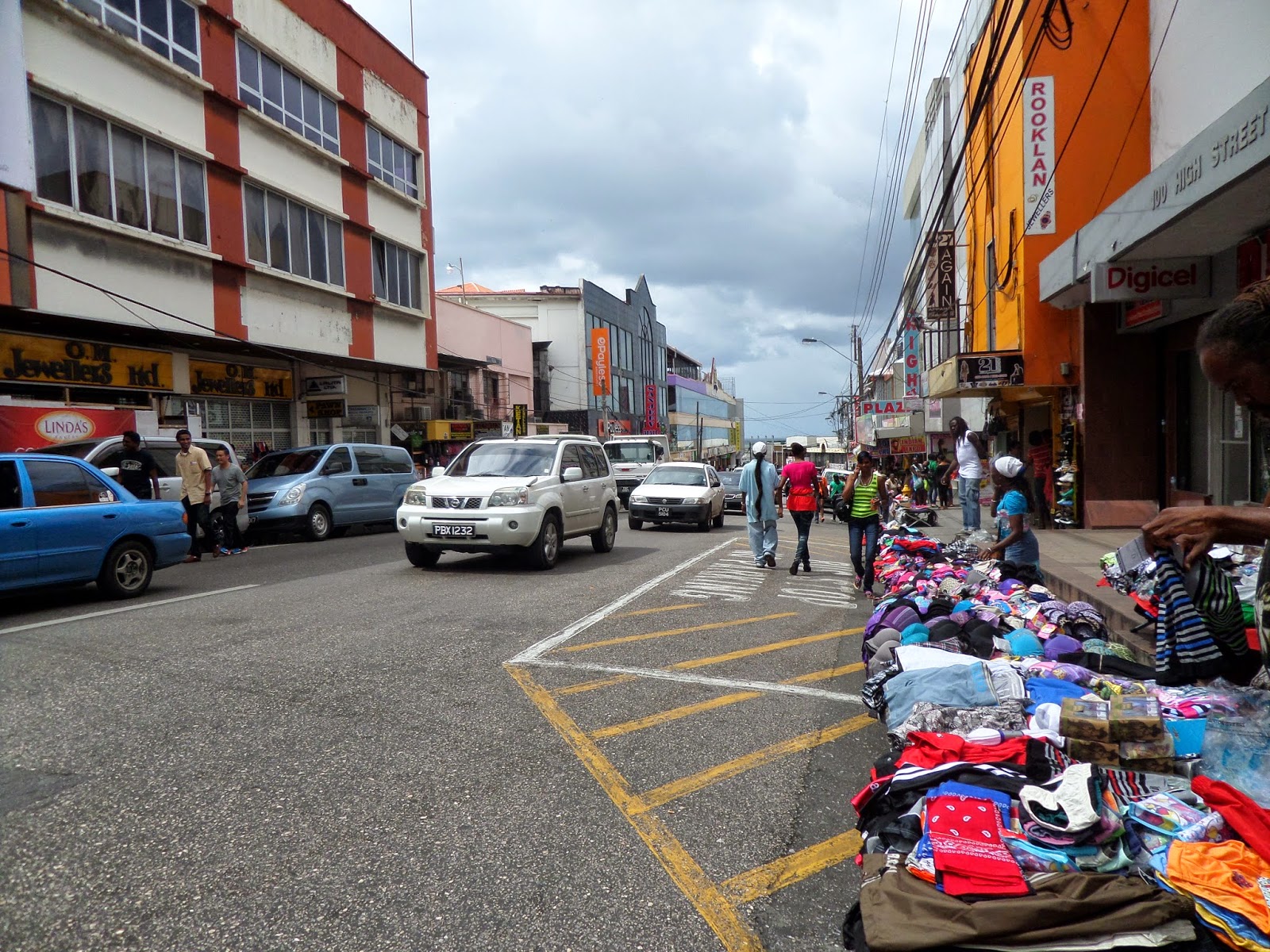INFORMAL SECTOR
In
the mega cities in the Global south, the informal sector constitutes
a significant part of the urban economy and employment market. In
Trinidad and Tobago, unemployment rates are approximately 6% which
therefore leads to growth of the informal sector (Bridgelal 2011).
Within the city of San Fernando, this can be seen through street
vending at the sides of the roads in the CBD – High Street, San
Fernando. The informal sector however, is a phenomenon of great
diversity. (Daniel 2004) The
informal economy is large and pervasive and often ignored.
 |
| Street Vendors in the CBD- High Street, San Fernando |
Four
sub-sectors within the informal sector have been identified by Potter
and Lloyd-Evans (2004) in Hall and Barrett (2012). These include:
- The subsistence sector
- Small scale producers
- Petty Capitalist Sector
- Criminal Sub-sector
Characteristics
of the informal sector includes according to Drakakis-Smith
(2000;131):
- Ease of entry
- Irregular hours/pay
- Local inputs
- Family property
- Small scale
- Labour intensive
- Adapted technology
- Non-School skills
- Unregulated market
However
the question that arises of having the informal sector, is whether
its presence is beneficial or burdensome for cities.
“Trying
to bring the informal sector into the fold has several advantages.
Not
only is it unregulated and untaxed, it typically provides only
low-wage and low-productivity jobs. Rigid labor market and business
regulations often reinforce the barriers between the formal and
informal sectors.” (iMF Direct 2011)
Lately,
many agencies, according to Hall and Barrett (2012) consider informal
economic activities in a more positive light, viewing them as a means
by which the poor urban sector can help themselves by providing good
and services at an affordable price and as the provider of employment
opportunities that occupy many within cities where limited formal
opportunities exist.
The informal sector is also viewed as
an alternative to the capitalist system. However, the reliance on the
informal sector activity can also be viewed as an excuse for
authorities to ignore problems in the city.
What
are the disadvantages of the informal sector?
The
answer to this, relates to losses on the paths of people and also the
government. The people/workers, because they end up working in an
unregulated, unprotected, insecure environment, and the government,
because they loose out on tax revenue. According to the iMF Direct
(2011) People not only loose out on social benefits, but they end up
seeing their talents and traits diminish, as they have no avenue to
further develop themselves, and thereby give no prospect of a brighter
career path or career advancement.
“Lack
of access to well-paying and productive jobs—particularly for the
growing number of young labor-force entrants—translates into lost
opportunities and is a source of tension, for individuals and for
society as a whole.” (iMF Direct 2011)
Citing
exactly from the iMF Direct (2011) is the following on What can
policy makers do in terms of the informal sector issue, written by
Masood Ahmed, November 16, 2011.
“ What
can policymakers do?
- To improve access to economic opportunities and achieve more inclusive growth, policymakers will need to reduce the costs and burdens of entering the formal economy.
- Changing labor regulations can make it less expensive for employers to hire workers formally.
- More straightforward rules for establishing and operating a business will encourage entrepreneurs to start businesses on a formal basis. Enforcing the rules fairly and consistently means that firms share not only the responsibilities but also the benefits of operating formally.
- Simpler tax regulations and stronger administration will complement these reforms. At the same time, workers in the informal sector will need help in acquiring the skills demanded by the formal sector. “
The following is a link/Video related to ways of improving informal sector economies:
References
Ahmed,
Masood. 2011."Bringing the Informal Sector into the Fold."
iMFdirect
- The IMF Blog(blog).
Accessed April 9, 2014.
http://blog-imfdirect.imf.org/2011/11/16/bringing-the-informal-sector-into-the-fold/.
Bridgelal,
Carla. 2011. "Rise in unemployment - Total Economic Waste."
The
Trinidad Express.
Accessed April 10, 2014.
http://www.trinidadexpress.com/business-magazine/rise_in_unemployment_A_TOTAL_ECONOMIC_WASTE-131569578.html.
Daniels,
P.W. (2004) 'Urban challenges: the formal and informal economies in
mega-cities,' Cities, 21
(6):501-511
Hall,
Tim, and Heather Barrett. 2012. “The informal economy in Cities –
alternative economic spaces.” Urban
geography.
London: Routledge.
No comments:
Post a Comment